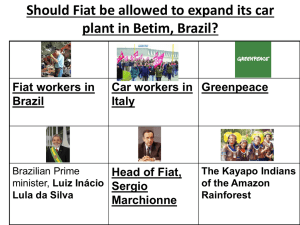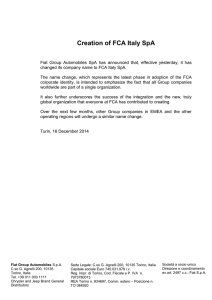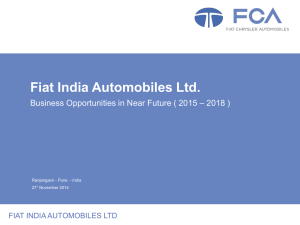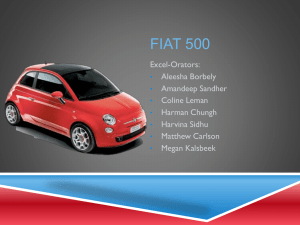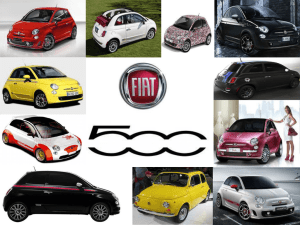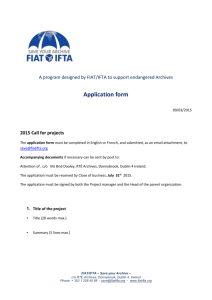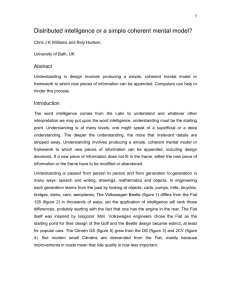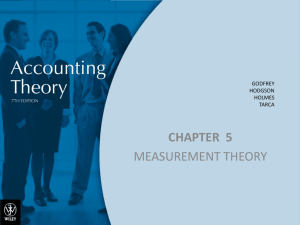main risks and uncertainties to which fiat spa and fiat group
advertisement
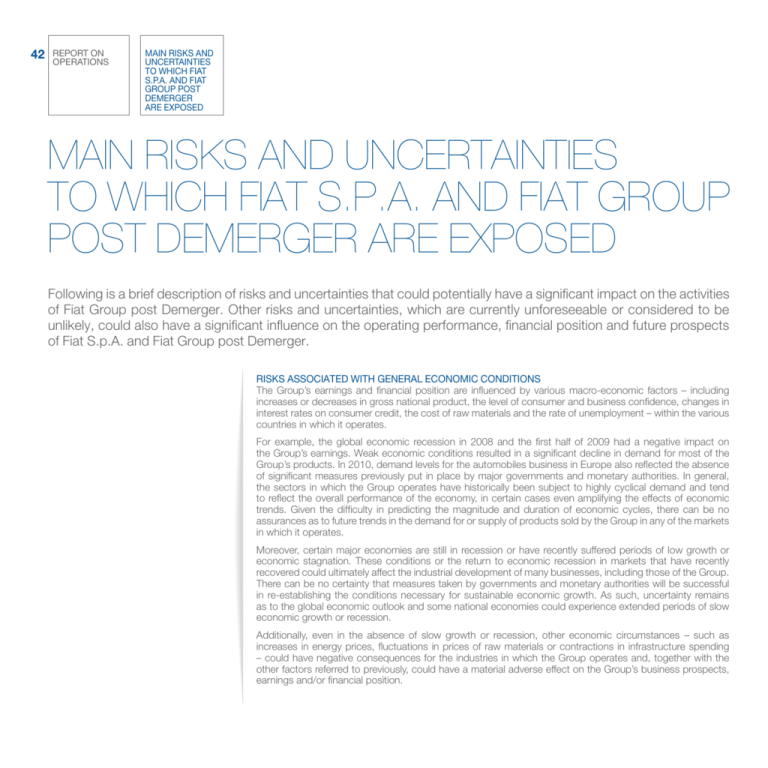
42 report on operations MAIN RISKS AND UNCERTAINTIES TO WHICH FIAT S.P.A. AND FIAT GROUP POST DEMERGER ARE EXPOSED MAIN RISKS AND UNCERTAINTIES TO WHICH FIAT S.P.A. AND FIAT GROUP POST DEMERGER ARE EXPOSED Following is a brief description of risks and uncertainties that could potentially have a significant impact on the activities of Fiat Group post Demerger. Other risks and uncertainties, which are currently unforeseeable or considered to be unlikely, could also have a significant influence on the operating performance, financial position and future prospects of Fiat S.p.A. and Fiat Group post Demerger. Risks associated with general economic conditions The Group’s earnings and financial position are influenced by various macro-economic factors – including increases or decreases in gross national product, the level of consumer and business confidence, changes in interest rates on consumer credit, the cost of raw materials and the rate of unemployment – within the various countries in which it operates. For example, the global economic recession in 2008 and the first half of 2009 had a negative impact on the Group’s earnings. Weak economic conditions resulted in a significant decline in demand for most of the Group’s products. In 2010, demand levels for the automobiles business in Europe also reflected the absence of significant measures previously put in place by major governments and monetary authorities. In general, the sectors in which the Group operates have historically been subject to highly cyclical demand and tend to reflect the overall performance of the economy, in certain cases even amplifying the effects of economic trends. Given the difficulty in predicting the magnitude and duration of economic cycles, there can be no assurances as to future trends in the demand for or supply of products sold by the Group in any of the markets in which it operates. Moreover, certain major economies are still in recession or have recently suffered periods of low growth or economic stagnation. These conditions or the return to economic recession in markets that have recently recovered could ultimately affect the industrial development of many businesses, including those of the Group. There can be no certainty that measures taken by governments and monetary authorities will be successful in re-establishing the conditions necessary for sustainable economic growth. As such, uncertainty remains as to the global economic outlook and some national economies could experience extended periods of slow economic growth or recession. Additionally, even in the absence of slow growth or recession, other economic circumstances – such as increases in energy prices, fluctuations in prices of raw materials or contractions in infrastructure spending – could have negative consequences for the industries in which the Group operates and, together with the other factors referred to previously, could have a material adverse effect on the Group’s business prospects, earnings and/or financial position. 43 Risks associated with financing requirements The Group’s future performance will depend on, among other things, its ability to finance debt repayment obligations and planned investments from operating cash flow, available liquidity, the renewal or refinancing of existing bank loans and/or facilities and possible recourse to capital markets or other sources of financing. Although the Group has measures in place to ensure that adequate levels of working capital and liquidity are maintained, any declines in sales volumes could have a negative impact on the cash-generating capacity of its operating activities. The Group could, therefore, find itself in the position of having to seek additional financing and/or refinance existing debt, including in unfavorable market conditions with limited availability of funding and a general increase in funding costs. Any difficulty in obtaining financing could have a material adverse effect on the Group’s business prospects, earnings and/or financial position. Risks associated with Fiat S.p.A.’s credit rating The ability to access the capital markets or other forms of financing and the related costs are dependent, amongst other things, on the Group’s credit ratings. Following downgrades by the major rating agencies in the first quarter of 2009, Fiat S.p.A. is currently rated below investment grade with ratings on its long-term debt of Ba1 (with negative outlook) from Moody’s Investors Service, BB+ (with negative outlook) from Standard & Poor’s Ratings Services and BB+ (with negative outlook) from Fitch Ratings Ltd. On 23 April 2010, following Fiat’s announcement of the proposed Demerger, Standard & Poor’s placed Fiat S.p.A. on CreditWatch with negative implications. The CreditWatch status was confirmed on 1 October 2010 and the rating agency is currently reviewing the Company’s status. On 21 July 2010, Moody’s Investors Service placed Fiat S.p.A.’s rating on review for possible downgrade. That review was completed on 9 February 2011 and Moody’s confirmed a rating of Ba1 with negative outlook. On 22 April 2010, however, Fitch Ratings Ltd. confirmed its rating (BB+ with negative outlook) on Fiat’s long-term debt. Any further downgrades could increase the Group’s cost of capital and potentially limit its access to sources of financing with a consequent material adverse effect on the Group’s business prospects, earnings and/or financial position. Risks associated with fluctuations in currency, interest and credit risk The Group, which operates in numerous markets worldwide, is naturally exposed to market risks stemming from fluctuations in currency and interest rates. The exposure to currency risk is mainly linked to the difference in geographic distribution between the Group’s manufacturing activities and its commercial activities, resulting in cash flows from exports denominated in currencies that differ from those associated with production activities. The Group uses various forms of financing to cover funding requirements for its industrial activities and for financing customers and dealers. Moreover, liquidity for Industrial Activities was also principally invested in variable-rate or short-term financial instruments. The Financial Services companies operate a matching policy to offset the impact of differences in rates of interest on the financed portfolio and related liabilities. Nevertheless, changes in interest rates can result in increases or decreases in revenues, finance costs and margins. Consistent with its risk management policies, the Group seeks to manage risks associated with fluctuations in currency and interest rates through the use of financial hedging instruments. Despite such hedges being in place, sudden fluctuations in currency or interest rates could have an adverse effect on the Group’s business prospects, earnings and/or financial position. The Group’s Financial Services activities are also subject to the risk of insolvency of dealers and end customers, as well as unfavorable economic conditions in markets where these activities are carried out, which the Group seeks to mitigate through the credit approval policies applied to dealers and end customers. 44 report on operations MAIN RISKS AND UNCERTAINTIES TO WHICH FIAT S.P.A. AND FIAT GROUP POST DEMERGER ARE EXPOSED Risks associated with the policy of targeted industrial alliances The Group has engaged in the past, and may engage in the future, in significant corporate transactions such as mergers, acquisitions, joint ventures and restructurings, the success of which is difficult to predict. In particular, although Fiat Group holds a 25% interest in Chrysler Group LLC and has signed agreements for the establishment of a global strategic alliance, there can be no assurance that this alliance will function as intended or produce the expected benefits. There can be no assurance that Fiat Group post Demerger will succeed in achieving the synergies, cost savings, expansions in its product offerings or other benefits expected from the strategic alliance with Chrysler Group LLC or any other transaction. The failure of any significant strategic alliance, joint venture or other similar transaction could have an adverse effect on the business prospects, earnings and/or financial position of Fiat Group post Demerger. Risks associated with relationships with employees and suppliers In many countries where the Group operates, Group employees are protected by various laws and/or collective labor agreements that guarantee them, through local and national representatives, the right of consultation on specific matters, including downsizing or closure of production units and reductions in personnel. The laws and/or collective labor agreements applicable to the Group could impair its flexibility in reshaping and/or strategically repositioning its business activities. The Group’s ability to reduce personnel or implement other permanent or temporary redundancy measures is subject to government approvals and the agreement of the labor unions. Industrial action by employees could have an adverse impact on the Group’s business activities. Furthermore, the Group purchases raw materials and components from a large number of suppliers and relies on services and products provided by companies outside the Group. Some of these companies are highly unionized. Close collaboration between a manufacturer and its suppliers is common in the industries in which the Group operates and although this offers economic benefits in terms of cost reduction, it also means that the Group is reliant on its suppliers and is exposed to the possibility that difficulties, including those of a financial nature, experienced by those suppliers (whether caused by internal or external factors) could have a material adverse effect on the Group’s business prospects, earnings and/or financial position. Risks associated with management The Group’s success is largely dependent on the ability of its senior executives and other members of management to effectively manage the Group and individual areas of business. The loss of any senior executive, manager or other key employee without an adequate replacement or the inability to attract and retain new, qualified personnel could therefore have an adverse effect on the Group’s business prospects, earnings and/or financial position. Risks associated with the high level of competition in the industries in which the Group operates Substantially all of the Group’s revenues are generated in the automobile industry, which is highly competitive and encompasses the production and distribution of passenger cars and the related components and production systems. The Group faces competition from other international passenger car and light commercial vehicle manufacturers and distributors and related components suppliers in Europe and Latin America. These markets are highly competitive in terms of product quality, innovation, pricing, fuel economy, reliability, safety, customer service and financial services offered. 45 Competition, particularly in pricing, has increased significantly in the Group’s industry sector in recent years. In addition, partly as a result of the contraction in demand for automobiles, global production capacity for the car industry significantly exceeds current demand. This overcapacity, combined with high levels of competition and weakness of major economies, could intensify pricing pressures. Should the Group be unable to adapt effectively to external market conditions, this could have an adverse effect on its business prospects, earnings and/or financial position. Risks associated with the activities of Fiat Group post Demerger being concentrated in the Automobiles and automobile components sector Pursuant to the Demerger, Fiat S.p.A. transferred its shareholdings in companies operating in the Agricultural and Construction Equipment, and the Trucks and Commercial Vehicles sectors to Fiat Industrial S.p.A., together with the “Industrial & Marine” business line of FPT Powertrain Technologies. Consequently, Fiat S.p.A.’s principal activities are the automobile and the automobile-related components & production systems businesses, that include Fiat Group Automobiles, Ferrari, Maserati, Magneti Marelli, Teksid and Comau, in addition to the “Passenger & Commercial Vehicles” business line of FPT Powertrain Technologies. By contrast to the profile of Fiat Group prior to 31 December 2010, the future earnings of Fiat Group post Demerger will, therefore, be determined by the financial performance of those businesses only. In the Automobiles business, sales to end customers are cyclical and subject to changes in the general condition of the economy, the readiness of end customers to buy and their ability to obtain financing and the possible introduction of measures by governments to stimulate demand. The sector is also subject to constant renewal of the product offering through frequent launches of new models. A negative trend in the Automobiles business could have a material adverse impact on the business prospects, earnings and/or financial position of the Fiat Group post Demerger. Risks associated with selling in international markets and exposure to changes in local conditions A significant portion of the Group’s existing activities are conducted and located outside of Italy and the Group expects that revenues from sales outside Italy – and, more generally, outside of the European Union – will account for an increasing portion of total revenues. The Group is subject to risks inherent to operating globally, including those related to: exposure to local economic and political conditions; import and/or export restrictions; multiple tax regimes, including regulations relating to transfer pricing and withholding and other taxes on remittances and other payments to or from subsidiaries; foreign investment and/or trade restrictions or requirements, foreign exchange controls and restrictions on repatriation of funds; and/or the introduction of more stringent laws and regulations. Unfavorable developments in any one of these areas (which may vary from country to country) could have a material adverse effect on the Group’s business prospects, earnings and/or financial position. 46 report on operations MAIN RISKS AND UNCERTAINTIES TO WHICH FIAT S.P.A. AND FIAT GROUP POST DEMERGER ARE EXPOSED Risks associated with environmental and other government regulation The Group’s products and activities are subject to numerous environmental laws and regulations (local, national and international) which are becoming increasingly stringent in many countries in which it operates (particularly in the European Union). Such regulations govern, among other things, products – with requirements for emissions of polluting gases, reduced fuel consumption and safety becoming increasingly stricter – and industrial plants – with requirements for emissions, treatment of waste and water and prohibitions on soil contamination. To comply with such regulations, the Group employs considerable resources and expects it will continue to incur substantial costs in the future. In addition, government initiatives to stimulate consumer demand for products sold by the Group, such as changes in tax treatment or purchase incentives for new vehicles, can substantially influence the timing and level of revenues. The size and duration of such government measures is unpredictable and outside of the Group’s control. Any adverse change in government policy relating to those measures could have a material adverse effect on the Group’s business prospects, operating results and/or financial position. Risks associated with the ability to offer innovative products The success of the Group’s businesses depends on their ability to maintain or increase share in existing markets and/or to expand into new markets through the development of innovative, high-quality products that provide adequate profitability. In particular, the failure to develop and offer innovative products that compare favorably to those of the Group’s principal competitors in terms of price, quality, functionality and features, or delays in bringing strategic new models to market, could result in reduced market share, having a material adverse effect on the Group’s business prospects, earnings and/or financial position. Risks associated with operating in emerging markets The Group operates in a number of emerging markets, both directly (e.g., Brazil and Argentina) and through joint ventures and other cooperation agreements (e.g., Turkey, India, China and Russia). The Group’s exposure to these countries has increased in recent years, as has the number and importance of such joint ventures and cooperation agreements. Economic and political developments in these markets, including economic crises or political instability, have had and could in future have a material adverse effect on the Group’s business prospects, earnings and/or financial position.
